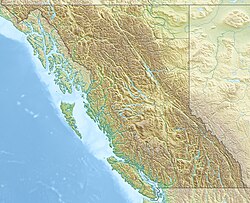| Mount Foch | |
|---|---|
 Mounts Foch and Sarrail | |
| Highest point | |
| Elevation | 3,194 m (10,479 ft) [1] |
| Prominence | 384 m (1,260 ft) [1] |
| Parent peak | Mount Pétain (3196 m) [1] |
| Listing | |
| Coordinates | 50°34′22″N115°09′22″W / 50.57278°N 115.15611°W [2] |
| Geography | |
 | |
| Interactive map of Mount Foch | |
| Country | Canada |
| Provinces | Alberta and British Columbia |
| Parent range | Park Ranges [1] |
| Topo map | NTS 82J11 Kananaskis Lakes [2] |
| Climbing | |
| First ascent | 1930 Katie Gardiner, Walter Fuez [3] |
Mount Foch is a 3,194-metre (10,479-foot) mountain summit located at the Northern end of Elk Lakes Provincial Park, [4] and straddles the Continental Divide marking the Alberta-British Columbia border [5] in Canada. It was named in 1918 after Marshal of France Ferdinand Foch. [3] [1]
Contents
The first ascent of the mountain was made in 1930 by Kate (Katie) Gardiner and Walter Feuz. [1] The duo also made the first ascents of nearby Mount Sarrail and Mount Lyautey that same year. [3]



